Plagiarism, prizes, deaths, and dick soap marked the longest year in recent history
Well, this year sure has been a hundred years long! As we struggle out of this enormous frying pan and before we drop into the inevitable fire, let’s revisit some of the stories that took over our news and Twitter feeds this year (and were then immediately supplanted by, like, a Nazi running for Congress and entirely forgotten). We tried to mix it up so that some of them are… well not fun exactly, fun was hard to come by this year, but at least dripping with schadenfreude.

10. Overlooked Women Writers (and Others) Get Belated Obituaries
In the 167 years that The New York Times has been covering notable deaths, only 20 percent of the obituaries have been for women. This shocking (or maybe not so shocking) statistic came out this year when Amisha Padnani, the digital editor at the obituaries desk, and Jessica Bennett, the first gender editor at the Times, teamed up to start an ongoing series dedicated to the remarkable people that the newspaper had previously deemed unworthy of taking up space in their pages. Padnani, after joining the obit desk and discovering this blatant oversight, wrote, “It is difficult for me as a journalist to see important stories go untold. But perhaps more important, as a woman of color, I am pained when the powerful stories of incredible women and minorities are not brought to light.” The series, Overlooked, began on March 8th with essays celebrating the lives of Sylvia Plath, Nella Larsen, and Charlotte Brontë, to name a few, and has since been publishing weekly articles. Because of the unique responsibility of these essays to honor people that died in the past, they diverge slightly from the typical obituary style, highlighting accomplishments achieved during their lifetimes as well as the legacies they left behind.
Sylvia Plath, Nella Larsen, and Charlotte Brontë Finally Get New York Times Obits
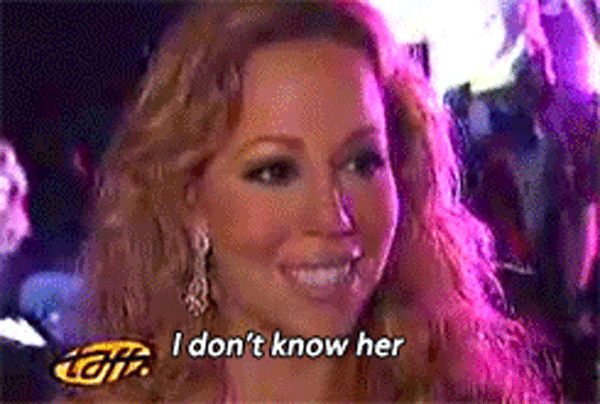
9. Tomi Adeyemi Takes On Nora Roberts, Does Not Win
Tomi Adeyemi, the (rightly!) highly-praised and bestselling author of fantasy novel Children of Blood and Bone, has… perhaps never been in a grocery store? That’s the only reason we can think of for why she would accuse Nora Roberts—yes, that Nora Roberts, the one for whom the word “bestselling” is inadequate—of trying to “shamelessly profit off” her fame with a novel called Of Blood and Bone. Roberts set her right with a blog post that a) serves double duty as a primer on publishing (titles can’t be copyrighted! A book that comes out eight months after yours was probably already written when yours was published!), b) serves triple duty as a rousing indictment of social media mobs, and c) belongs in the “I don’t know her” hall of fame. The two apparently spoke afterwards to clear things up, and Adeyemi eventually deleted her tweet alleging plagiarism, but not before giving her publicist a heart attack probably.
This Romance Novelist Trademarked the Word ‘Cocky’
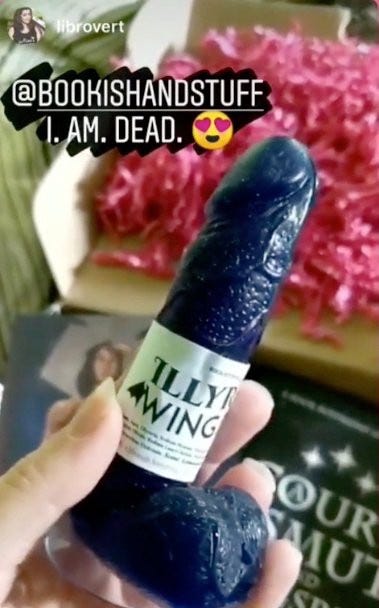
8. Incomprehensible Marketing Decisions Rock Twitter
The usual maxim “any publicity is good publicity” got put to the test this year, with baffling book (and book-adaptation TV) marketing schemes that broke, or at least bewildered, the internet. In July, Hulu announced—and, after online outcry, swiftly canceled—a line of three Handmaid’s Tale-themed wine varietals. As we noted at the time, this was a particularly head-scratching entry in a long list of dubious Handmaid’s Tale merchandising schemes, including lingerie. And in August, every tweet on the timeline was briefly about “dick soap,” due to subscription service Book Boyfriend Box choosing to send the above memento in a package (lol) themed after Sarah J. Maas’s A Court of Thorn and Roses series. Read more about the dick soap here, including an explanation of sorts from Book Boyfriend Box (although be warned that we made the same “package, lol” joke. It’s irresistible under the circumstances!).
Young Adult Novel Twitter Is Losing Its Absolute Mind Over Penis-Shaped Soap
7. The Summer of Scam Makes Its Way Into the Writing World
Call it Grifter Season, call it the Summer of Scam: 2018 was marked by several sensational deep-dive stories about con artists. Anna Delvey, Anthony Gignac, William Baekeland, Donald Trump — we were mesmerized and horrified in equal measure by their schemes. In July, the literary world got its own grifter: Anna March (a fake name), whose fraudulent acts included charging up to $3,000 for nonexistent writing workshops and raising nearly $50,000 for a magazine that offered writers $25 per piece — and didn’t actually pay it. If you love these kinds of stories, this is the kind of story you’ll love. (And you can follow it up with our list of grifters in literature.)
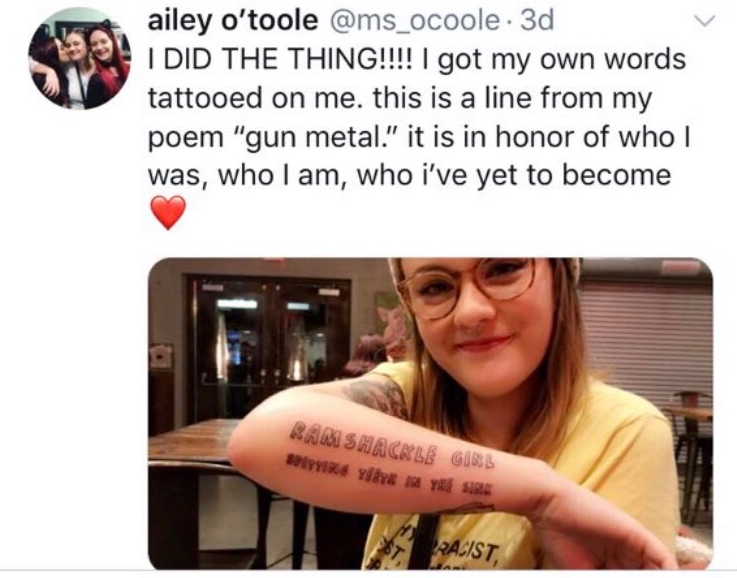
6. Instagram Post of a Tattoo Reveals Plagiarism
Up-and-coming poet Ailey O’Toole celebrated her Pushcart prize nomination by getting a tattoo of a line from her poem on her arm. After seeing O’Toole’s Instagram post, her former co-worker, Kristina Conrad, felt certain that she has seen that phrase before. Conrad googled the phrase, revealing that it had been lifted from blud, a poetry collection by Rachel McKibbens. Conrad emailed O’Toole’s literary press, Rhythm & Bones, with her findings, which led to the cancellation of the poet’s upcoming collection. In a misguided attempt at damage control, O’Toole DMed McKibbens on Twitter, writing that “in paraphrasing you, I had hoped to put our poems into conversation with each other and go on to explore new terrain opened up for me by your work.” Obviously, this did not sit well with McKibbens, nor did the tattoo’s questionable artistic merits. She told Vulture: “This Trapper Keeper, hollow bubble font. You took the music out of my words, you pulled the teeth out of it, you lessened the work when you rewrote it, and then you went and put it in a really shoddy font. That hurts.” Further investigation revealed that O’Toole had plagiarized from several other poets. And she probably could have gotten away with it if she hadn’t gotten that tattoo!
Avoiding Plagiarism Sometimes Requires a Leap of Faith

5. Lauren Groff Makes Q&As Feel Important Again
Leave it to Lauren Groff to shatter a form we thought we knew and turn it into something glittering and sharp. Not once, but twice this year, Groff used the standard Q&A as an opportunity to illuminate the realities of being a woman writer. First, as part of The New York Times’s “By the Book,” Groff was asked which three authors she would have to dinner (a standard question for the column). Her response: hundreds of women writers with “unlimited quantities of excellent wine and we would get blitzed and the conversation may eventually meander to touch on that most baffling of questions: When male writers list books they love or have been influenced by — as in this very column, week after week — why does it almost always seem as though they have only read one or two women in their lives?” It’s worth reading the whole thing — and then going on to read our own Read More Women series, which Groff’s gracious fury helped inspire. But she wasn’t done reinventing the Q&A. When The Harvard Gazette asked how, as a mother of two, she manages the balance between work and life, Groff put the question to bed: “Until I see a male writer asked this question, I’m going to respectfully decline to answer it.” Mic dropped.
Kicking Off Our ‘Read More Women’ Series with Maria Dahvana Headley
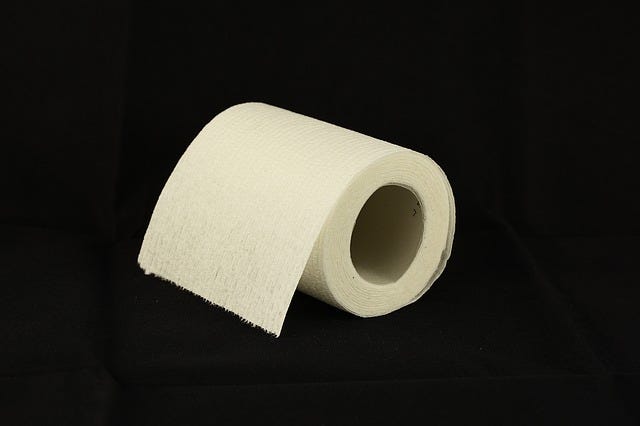
4. Shitty Media Men (and Women) Fight Back
Last year was marked by the (initially private) distribution of the “Shitty Media Men” spreadsheet, an anonymously crowdsourced document naming alleged abusers in the media and literary landscapes. It was first circulated as a kind of centralized whisper network, where women shared their warnings about who to avoid, but it almost immediately blew up publicly, causing a great deal of anger—though mostly not directed towards the men. In early January, allegedly threatened with exposure by a (woman) writer seeking to undermine the list in Harper’s, Moira Donegan came forward as the person who started the spreadsheet. (If you read one article on the whole mishegas, make it that piece, which is wonderful.) In October, on the anniversary of the list’s first appearance, professional Aggrieved Man Stephen Elliott (who had already written a long essay about his sexual proclivities/hassling of people who rejected him/conviction that being named on the spreadsheet was the only reason his book didn’t sell) filed a $1.5 million lawsuit against Donegan. Elliott also demanded the names of every woman who contributed to the spreadsheet so he could sue them as well. Gosh, we stand corrected—you must not be shitty after all.
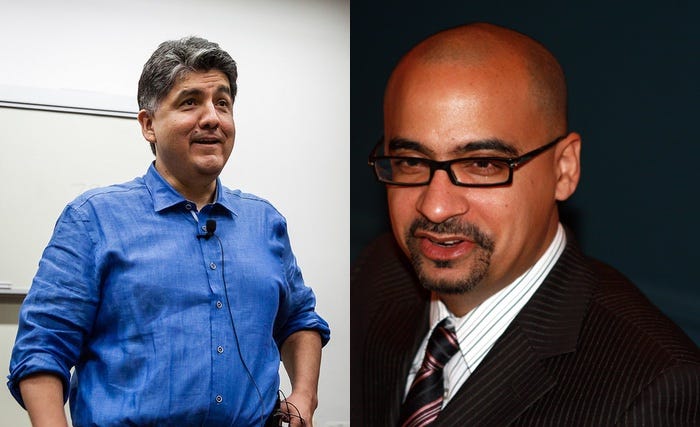
3. Sherman Alexie and Junot Díaz Accused of Abusing Women
Continuing last year’s theme of men occasionally facing a single consequence for their actions, Sherman Alexie and Junot Díaz — each hailed as a star of literary culture — were both accused of abusive actions towards women. Alexie, who was accused of sexual misconduct by at least ten women, lost several honors (the Institute of American Indian Arts renamed its Sherman Alexie Scholarship, the American Indian Library Association rescinded an award it had conferred ten years ago, and Alexie turned down his recently-awarded Carnegie Medal). Díaz, accused of verbal abuse and one instance of inappropriate physical contact, briefly stepped down from but is now back on the Pulitzer board.
What Do the Allegations Against Sherman Alexie Mean for Native Literature?

2. Ursula K. Le Guin Dies, Releases Album
Science fiction mastermind Ursula K. Le Guin was not the only literary figure we lost this year, but she was the most influential and legendary. Not only did she write dozens of seminal novels, children’s books, and short stories; win multiple Hugos, Nebulas, and World Fantasy Awards; and achieve the rank of “Grandmaster of Science Fiction”—she also developed a folk/electronica album to accompany one of her books, which was rereleased after her death. It’s no wonder that she’s inspired not only generations of writers, but several musicians. Celebrate her legacy with an essay about her little-known piece “Introducing Myself,” read some of her previously unpublished poems that first ran in the Commuter, or go back to last year for an excerpt about how to build a vision of utopia.
Ursula K. Le Guin‘s Folk/Electronica Album Can Teach Us a Lot About Storytelling

1. The 2018 Nobel Prize for Literature Canceled
For the first time in almost 60 years, there was no Nobel prize in literature this year. Why? The short: a sexual assault scandal, corruption, and nepotism. The long: eighteen women came forward accusing photographer Jean-Claude Arnault of sexual assault (he is also accused of groping Swedish Crown Princess Victoria). Arnault is the husband of poet Katarina Frostenson, and Frostenson is a member of the Swedish Academy that is responsible for handing out Nobel prize in literature. The assaults allegedly occurred in apartments owned by the academy. The couple are also accused of misusing academy funds and of illicitly profiting from Frostenson’s insider knowledge of the Nobel prizewinners.


10 Moments That Shook the Literary World in 2018 was originally published in Electric Literature on Medium, where people are continuing the conversation by highlighting and responding to this story.











